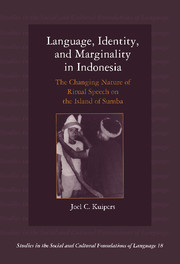 Language, Identity, and Marginality in Indonesia
Language, Identity, and Marginality in Indonesia Book contents
- Frontmatter
- Contents
- List of plates
- List of figures and tables
- Preface
- Acknowledgements
- Notes on orthography
- 1 Introduction
- 2 Place, identity, and the shifting forms of cultivated speech: a geography of marginality
- 3 Towering in rage and cowering in fear: emotion, self, and verbal expression in Sumba
- 4 Changing forms of political expression: the role of ideologies of audience completeness
- 5 Ideologies of personal naming and language shift
- 6 From miracles to classrooms: changing forms of erasure in the learning of ritual speech
- 7 Conclusions
- Notes
- Appendix
- References
- Index
- STUDIES IN THE SOCIAL AND CULTURAL FOUNDATIONS OF LANGUAGE
Preface
Published online by Cambridge University Press: 05 July 2011
- Frontmatter
- Contents
- List of plates
- List of figures and tables
- Preface
- Acknowledgements
- Notes on orthography
- 1 Introduction
- 2 Place, identity, and the shifting forms of cultivated speech: a geography of marginality
- 3 Towering in rage and cowering in fear: emotion, self, and verbal expression in Sumba
- 4 Changing forms of political expression: the role of ideologies of audience completeness
- 5 Ideologies of personal naming and language shift
- 6 From miracles to classrooms: changing forms of erasure in the learning of ritual speech
- 7 Conclusions
- Notes
- Appendix
- References
- Index
- STUDIES IN THE SOCIAL AND CULTURAL FOUNDATIONS OF LANGUAGE
Summary
On the island of Sumba, a poetic form of ritual speech once integral to the local system of religious and political authority has undergone a substantial shift in its meaning and use. This book is an examination of the history of that process of transformation and marginalization in its ethnographic and linguistic context. Transcriptions of recorded performances, Dutch and Indonesian archival materials, and first-hand interviews and observations over the course of 20 years of research on the island, form the core of the data on which much of this analysis is based.
This book differs in scope, method and approach from an earlier work (Kuipers 1990) in several important ways. That book focussed on the role of the ritual-speech tradition of verbal performance in the establishment of the “words of the ancestors” as textual authority. In that work, I emphasized the integral nature of the Weyewa system of ceremonial communication and its role in the enactment of what were regarded as the fixed and timeless ancestral words as guides to conduct and exchange.
I now see that in certain ways the authority system I described there was more circumscribed, fragile, and marginal than I had realized at the time. When I first carried out fieldwork on the island in 1978, only 20 percent of the population of the Weyewa were Christian, and the overwhelming majority were still practitioners of their indigenous ancestral religion, marapu, and this fact no doubt colored my perceptions of the importance of ritual speech in shaping their local system of authority.
- Type
- Chapter
- Information
- Language, Identity, and Marginality in IndonesiaThe Changing Nature of Ritual Speech on the Island of Sumba, pp. xi - xivPublisher: Cambridge University PressPrint publication year: 1998
